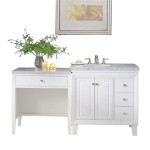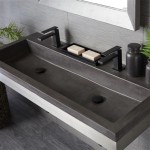Does Small Tile Make A Bathroom Look Bigger?
The impact of tile size on perceived bathroom space is a common design consideration. While no single rule dictates the ideal tile size, understanding the interplay of various factors can lead to a more spacious-feeling bathroom. This article explores the complex relationship between small tiles, grout lines, and the overall impression of size in a bathroom setting.
Key Considerations Regarding Tile Size and Perceived Space
Several factors influence how tile size affects the perception of space. Examining these elements helps to determine the best tile choice for a specific bathroom:
- Grout lines: The color and spacing of grout lines significantly impact the visual effect.
- Tile color and pattern: Light colors and simple patterns generally enhance the feeling of spaciousness.
- Bathroom size and layout: A small, narrow bathroom may respond differently to small tiles than a large, open one.
- Lighting conditions: Natural and artificial light interact with tile surfaces and grout lines, affecting the overall perception of size.
The Impact of Grout Lines
Grout lines play a crucial role in the visual effect of tiled surfaces. Numerous grout lines created by small tiles can contribute to a busier, more textured look. This visual busyness can, in some instances, make a space feel smaller. Conversely, wider grout lines, often paired with larger tiles, can create a more open and airy feel.
The Role of Tile Color and Pattern
Light-colored tiles reflect more light, creating an illusion of spaciousness. Darker tiles absorb light, which can make a room feel smaller. Similarly, complex patterns can visually clutter a space, while simple, uniform patterns lend themselves to a more open feel. Choosing a light-colored grout that blends seamlessly with the tile can minimize the visual impact of grout lines and further enhance the impression of size.
Considering Bathroom Size and Layout
The existing dimensions and layout of the bathroom are vital considerations. In a small bathroom, using very small tiles, particularly on the floor, can sometimes create a visually cluttered look. However, small tiles can be effectively used on walls or as accent features in smaller spaces without diminishing the perceived size. In larger bathrooms, the impact of small tiles is less pronounced, and they can be used more liberally.
Lighting and Its Effects
Natural light amplifies the reflective properties of light-colored tiles, enhancing the illusion of spaciousness. In bathrooms with limited natural light, strategic placement of artificial light sources can achieve a similar effect. Well-placed lighting minimizes shadows and highlights the tile surfaces, creating a brighter, more open atmosphere.
Small Tiles in Specific Bathroom Areas
Small tiles can be particularly effective in specific areas within a bathroom, regardless of overall size. Shower floors, for instance, often benefit from smaller tiles for increased slip resistance. Small tiles can also be used to create visually appealing accents, such as backsplashes or borders, adding character to the bathroom without negatively impacting the perception of space.
Alternative Uses for Small Tiles
Beyond floor and wall coverings, small tiles offer design versatility. They can be used to create decorative elements like mosaic patterns, adding visual interest and personality. Incorporating small tiles in niches or as borders can break up large expanses of larger tiles, adding depth and complexity to the design.
Balancing Aesthetics and Functionality
Ultimately, the choice of tile size involves balancing aesthetics and functionality. While large tiles can contribute to a sense of spaciousness, small tiles offer advantages in terms of slip resistance and design flexibility. By carefully considering the factors discussed, homeowners can make informed decisions that enhance both the visual appeal and the perceived size of their bathrooms.
Maximizing Space Perception with Design Techniques
Several design techniques can maximize the perception of space, regardless of tile size. Using large mirrors, incorporating vertical storage solutions, and maintaining a clean, uncluttered aesthetic can create a more open and airy feeling. These strategies complement tile choices and contribute to a cohesive design scheme that enhances the overall bathroom experience.
Long-Term Considerations for Tile Selection
When choosing tile size, considering long-term maintenance is crucial. Smaller tiles mean more grout lines, which can require more cleaning and maintenance. Selecting a high-quality, stain-resistant grout can mitigate this, ensuring the bathroom remains visually appealing and easy to maintain over time.

How To Make A Small Bathroom Look Bigger Ashley S Edit

19 Tricks To Make A Small Bathroom Look Bigger First Choice Warehouse

12 Ways To Make Any Bathroom Look Bigger

12 Ways To Make Any Bathroom Look Bigger

19 Tricks To Make A Small Bathroom Look Bigger First Choice Warehouse

How To Make A Small Bathroom Look Larger Room For Tuesday

How To Make A Small Bathroom Look Bigger With Tiles

These 7 Tiles Ideas Can Make A Tiny Bathroom Feel Bigger

How To Make A Small Bathroom Look Bigger With Tiles

How To Make A Small Bathroom Look Bigger Ashley S Edit
Related Posts







